- Home
- Molly Harper
Where the Wild Things Bite (Half-Moon Hollow #8) Page 5
Where the Wild Things Bite (Half-Moon Hollow #8) Read online
Page 5
He hovered way too close, way too fast, his nose nearly touching my forehead. I didn’t even have time to stumble back.
“Don’t even joke about it,” he purred, sliding his hand down my arm and pulling me toward him. My mouth went dry, but other parts were considerably . . . damper. And it had nothing to do with our recent swim. Unlike most people who met me, he hadn’t underestimated me on sight. He considered me a threat to his well-being. He didn’t treat me like I was made of particularly stupid spun sugar. He didn’t assume I would never do him harm while he was sleeping because I was “too nice” or “too calm” or any other number of synonyms for “too weak to do anything but bitch and moan.” It was a refreshing change.
It was bad that Finn seeing me as a potential threat was a turn-on, right? That was not something that got well-adjusted grown-up ladies all hot and bothered.
Because I was both hot and bothered when his cheek brushed mine as he whispered, “You need me. I may need you to keep watch during the day, but you need me, too, kitten. For everything else.”
What exactly did “everything else” entail?
I was exhausted—mentally, emotionally, physically. Otherwise, I probably would have cowered. A more sensible Anna would have stammered out an apology and possibly passed out. But I’d hit my limit, the wall, I’d been clotheslined by the finish ribbon. And a “one hundred percent done” Anna was an Anna without a sense of self-preservation.
So I poked him. In the chest. Repeatedly.
“Don’t. Call. Me. Kitten,” I ground out, emphasizing each word with a poke.
Instead of draining me and disposing of my husk-like carcass, Finn grinned at me, with the tiniest edge of madness in his eyes. “Let’s get some sleep.”
“You are the most confusing man in the world.” I sighed, as he gracefully slipped under the lowermost pine boughs.
He poked his head out of the needles. “Well, I’m guessing your experience is limited.”
“That’s it!” I hissed. “I’m sleeping out here.”
I did an about-face to a somewhat clear patch of grass, where I looked for a spot to lay my head.
“Anna.”
I ignored him. I knew that he was probably right. It wasn’t safe for me to sleep out in the open. It would be better for us to stay closer to each other. I was just so tired and too freaking proud to admit it. I could feel the exhaustion seeping into the marrow of my bones, leaching into my bloodstream.
“Anna.”
I whipped my head toward him, prepared to glare for all I was worth. He was half crouched on the ground, head and shoulders emerging from his pine shelter. He seemed totally focused on me, his eyes that same strange, cloudy bluish-white they’d turned on the plane.
I felt like a puppet whose strings had been cut. The energy that kept me in control of my limbs seemed to trickle away, leaving me empty, hollowed out. I was aware that I was standing, but nothing I was doing was keeping me that way. Without any signal from my brain, my feet shuffled toward the trees, where Finn was waiting with his hand outstretched. I slid my fingers into his, and he helped me slide under the canopy of pine. I barely felt the scratch of the needles against my skin as I lay on the ground. Finn took my purse and tucked it under my head. He put a good foot of space between us and laid his head on the ground.
I folded my hands over my stomach and stared up at the branches hanging just a few inches over my face. I was . . . calm. I wasn’t upset with Finn anymore. I wasn’t angry or scared or worried. I was a blank slate with no concerns at all. And I was shocked at how comfortable I was with this feeling. No medication, no therapy I’d tried could touch its blank, weightless serenity. For the first time in years, I felt free of the anxiety that had fueled so many of my actions and decisions over most of my lifetime. I closed my eyes and went about my nightly ritual of running through all of the things I had to accomplish the next day, reminding myself of big deadlines and problems looming. And while I could feel a sort of tug at the corners of my mind, I found I couldn’t think of one single errand or problem beyond two words, bold and red, on the backs of my eyelids: “STAY PUT.”
Exhaustion dragged me under, and before my mind dissolved into nothingness, I remembered those two words.
“STAY PUT.”
3
The key to survival in any situation involving the undead and hiking: dry socks and not panicking.
—Where the Wild Things Bite: A Survival Guide for Camping with the Undead
There’s nothing quite like waking up under a tree and realizing how badly you have to use a ladies’ room that is not there.
I rolled over on the dried pine needles, wincing at the occasional sharp poke through my sweater. My mouth felt as if sandpaper and cabbage had had a baby on my tongue, an evil baby. My eyes were sticky, and my lashes felt gummy. My head was pounding, and my feet felt like they were on fire.
In short, everything was awful.
I was on my side¸ snuggling into Finn’s chest, my nose buried in his shirt. His arm was slung around my back, pressing me close. His chin was tucked over the top of my head. It was an intimate, comfortable position—and completely bizarre, considering how little I knew about him and the fact that what I did know I didn’t like all that much.
My hands searched for my purse even before I was fully awake, winging above my head in a frantic gesture. I relaxed a bit as I felt the outline of the package and heard the crinkle of plastic. I eased out from under Finn’s arms, careful not to wake him.
I couldn’t help but admire him as he slept. He looked innocent and young, as if he wasn’t scheming six different ways to mock me or throw me out of perfectly good transportation. I stretched my hand up, running my thumb lightly over his bottom lip. From what I’d read, most vampires became more attractive after they were turned. Finn must have started with a pretty high bar. And then I remembered the reason that vampires were attractive. They needed to be able to draw in prey. Carnivorous flowers had bright colors to lure insects. Sneaky sea creatures blended into the sand so little fish would swim right into their open mouths. Vampires had perfect skin, mesmerizing eyes, and teeth so bright and sharp you leaned closer just to get a better look.
Just in case, I pried myself loose from his hold, scooting back. I wasn’t sure how quickly vampires needed to feed after waking. If the answer was “immediately,” I didn’t want to be in grabbing range.
He grumbled as I jostled him, mumbling in his sleep and running his hand over his face. I could see weak light filtering through the upper branches, but Finn’s face seemed intact. I would no longer doubt the power of the pine. Though my nose did feel awfully stuffy. Maybe I was allergic to pine pollen? I’d never been exposed to the outdoors all that much. My family weren’t exactly the Von Trapps. We did not climb any mountains or ford a single stream.
Also, wasn’t western Kentucky home to something called a “pine rattlesnake”? Ignoring the potential for vampire waking, I scrambled out from under the canopy into the weak twilight.
The good news, I supposed, was that I was clearly hydrated enough. The bad news was the lack of toilet tissue. I would not fall into the poison-ivy trap, I promised myself. After a few minutes of careful tree selection and diligent avoiding of “leaves of three,” I ambled back to the pines. I wondered if we would finally find something like civilization tonight. Surely we were getting closer to the edge of the preserve.
I blinked into the dim orange-ish light provided by the setting sun. The sky overhead was a dusky orange color, slowly transitioning to the purple in the horizon. But the sun was still very much out. My immediate instinct was to check my cell phone for the time, but as it was now a waterlogged plastic paperweight, I had to guess it was around six thirty. It wouldn’t be safe for Finn to come out in the open for at least another ten or twenty minutes, judging by the sun’s position. Technically, he could wake up at this hour, but his senses wouldn’t be as sharp, and he would move at a much slower pace—basically, me before I’ve been pr
operly caffeinated.
I stretched, cracking my neck and shaking the pine needles out of my hair. The ache in my feet was like a living thing, creeping up my legs and back and making me despair at the walking I knew I would have to do that night. Fortunately, I had my hunger to distract me. My stomach growled so loudly that I was afraid I might wake up Finn. I’d never been so hungry before, aching and hollow all the way through my middle, as if my stomach were crawling up my throat, demanding attention. My muscles burned with fatigue and poor sleep and just being done with this situation in general. I promised myself that as soon as we hit a town, I would ignore my mostly organic diet entirely and eat the largest, fattiest steak available. And mashed potatoes. And French fries. And a baked potato, swimming in butter. Basically, I would eat all of the potatoes.
I reached into my still-damp bag and pulled out the chocolate-chip granola bar. I always carried this sort of thing in my purse, because my metabolism tended to run pretty fast. And I tended to say hurtful things when I was hangry. I was grateful that the wrapper had stayed intact and the bar was dry. I definitely didn’t want to eat lake-soaked granola.
Part of me felt guilty for eating the only available food without even offering a bite to Finn. But human food smelled and tasted horrible to vampires anyway, something to do with them lacking the enzymes and functions required to digest it. Their bodies instinctually rejected the solids that could make them very ill. Frankly, it was probably a kindness not to eat it in front of him.
Of course, that didn’t solve the problem of what Finn would eat when he rose. But if I had to run from him, I would need the calories. I bit into the bar, grimacing at the sudden rush of cheap-chocolate sweetness that coated my tongue and teeth. I forced myself to take small bites, not to wolf it down. All I needed was to make myself sick and lose the granola bar, not to mention what little hydration I had in my system.
I was careful not to touch the granola with my filthy hands, shielding it from my fingertips with the slick foil wrapper. I had never felt so dirty or disheveled in my life. I knew now that I would not have made it as a pioneer woman. This only confirmed the suspicions I’d held since elementary school, when I was usually the first one to die of cholera in Oregon Trail.
I accepted that about myself. While I studied the ancient and rare, I was a modern woman. I needed technology and conveniences. Maybe that left me a little unprepared for wilderness treks, but I’d set up my life to avoid this sort of adventure, so I doubted very much that it would happen more than once.
I sat on the ground, far past caring if my jeans got dirty. I felt better with the blood sugar filtering into my system and the emptiness in my stomach fading a little bit. I would get through tonight. I would be able to walk, even if it did kill my feet. I was going to be OK.
All hail the power of chocolate, root of improbable positive thinking.
I glanced under the tree, where I could see a faint impression of his shoes through the branches. Did I really need Finn? I could walk through the woods. I could make it on my own. I mean, I’d made it this far, and I hadn’t exactly depended on Finn’s services as a guide. Surely Ernie had moved on by now. If I could get to a road, I could send someone back to look for Finn. Besides, he was a lot more prepared for this trek than I. He was an apex predator.
A somewhat annoying apex predator at that.
I stood, slinging my bag over my shoulder. I wondered if I should leave Finn a note or something, to let him know I was sorry for abandoning him. He might have protested that he’d given up barflies over the last year, but I imagined a guy like him had probably left more than his share of women to wake up alone in his long lifetime. He probably had this coming.
OK, that was classic rationalization, but I was still hungry and tired, and morals were not really high up on my priority list at the moment.
With the sun still glowing, the woods didn’t seem so scary. Ignoring every fairy tale that opened with a lone female venturing into the deep, dark forest, I pushed forward. The lush greenery was almost welcoming, slapping gently against my shoulders. My feet sank into the loose earth every other step, and my shoes rubbed against my heels in all the wrong places.
I tried to imagine what was happening in the “real world.” What had happened when we didn’t land in the Half-Moon Hollow airport? Had Jane been informed of the crash, or had she assumed that I just didn’t show up when I was expected to? Had she called Rachel in a panic, demanding to know the whereabouts of her book? Rachel was my emergency contact on all of my airline information, so she definitely would have been informed of the plane crash.
Rachel. She’d promised she’d wait up until she’d gotten my “landed safely” text. We always did that when we traveled separately. But my text hadn’t come. Did she think I was dead? In a normal “missing plane” situation, that could be the only believable scenario. Her innermost optimistic brain might tell her that there was some misunderstanding, but her rational mind would tell her that I was gone, that she was in charge of my estate now, such as it was.
I groaned. Had she called my mother yet? I’d told her so much about Mother; I could only imagine that she’d put that particular task off for as long as humanly possible. And if Rachel had called by now, I was sure that Mother had had a full-blown meltdown. Finally, all of her predictions of doom had come true. I hadn’t heeded her dire warnings on the dangers of traveling alone, and I wasn’t even present to watch her wallow in her triumph. Like all ungrateful children, I had paid the ultimate price for my resistance. She wouldn’t know whether to sob hysterically or shout “I told you so” from the rooftops.
Annabelle Whitfield was not a woman who tolerated resistance. Or disobedience. Or separation. Hell, she’d named me after her, hoping I’d want to spend my whole life as “Little Annabelle,” like some Southern-fried version of Grey Gardens. She’d been such a “devoted” mother, centering her whole life around me from my babyhood. Oh, she kept up a minimal social schedule, for appearance’s sake. She was the wife of a respected history professor, after all. She joined the right social clubs, involved me in the right activities, but at home, it was just the two of us. My father, a highly respected Civil War expert working for the University of Virginia, always seemed to be elsewhere. And that was how she liked it, though she always made it sound like such an ordeal to be left behind when he went on his research trips.
How dare he leave Mother alone when our house could catch on fire or a pipe could burst? She just couldn’t handle any of that. She wouldn’t know what to do. What was she supposed to do? I remember being eight years old and thinking that was a silly thing to say. I told her that I would call 911 or a plumber. But that didn’t make her happy. How would we pay the plumber? she’d ask me. What if she lost her checkbook? How would we get money for the household expenses? What if she cut her hand while she was making dinner and needed to go to the emergency room? How would we get there? I told her I would call the bank and report the checkbook lost. And if she couldn’t drive, I would call a cab, and we’d get to the emergency room. It became this weird game. Mother would make up more and more absolutely absurd worst-case scenarios, and I would come up with ways to fix them. And I didn’t even realize that I was taking on all of these adult responsibilities that I had no business doing.
Little by little, she shrank my world down with her anxieties and “what ifs.” She needed me too much at home for me to play sports or join school clubs. And I couldn’t go out with the few boys who asked. What if he tried to keep me out too late? What if he tried to drive drunk with me in the car? I had to stay home with her, just in case she needed me. We hadn’t been Dr. Phil’ed as a society yet, so I didn’t know terms like “enmeshment” and “grooming.” I didn’t know that she was basically setting me up to never leave home, never get married, never have a life of my own. She wanted me to stay at home forever, taking care of her like the doomed youngest daughter in Like Water for Chocolate.
We became a unit, “the Annabelles.” My acco
mplishments were her accomplishments. My struggles her struggles. She referred to us as “we.” It was never Anna, it was always “we.”
“We” were applying to colleges. And “we” were having trouble with piano lessons. “We” didn’t date, because it took too much time away from our studies. Even at a young age, I felt I was losing myself to her, as if she were trying to absorb me, sucking my life away, making it her own.
I knew it was unhealthy, but I’d learned quickly that pulling away from Mother, trying to assert myself as my own individual personality, triggered a total meltdown. An act as simple as asking her to step out of a dressing room while I changed would provoke tears. How could I push her away? How could I be so heartless when she’d done nothing but take care of me? How could I be so cold?
My father was no help. Sometimes I think he only agreed to have a child so my mother would have someone else to talk to. I’d tried to approach him about Mother, but he’d waved me away, told me that I would have to handle it, he was too busy. In a way, Mother seemed as disposable to him as I did. There was no love between them, just civility. They were partners, in the sense that being married got them both what they wanted in life, but that was it.
I learned to work around her. To rebel in my own small ways, starting with insisting that my high school classmates call me Anna and ending with moving to an area outside Atlanta too remote for her to consider visiting. I hadn’t seen her face-to-face in more than two years. I’d taken a cue from my father and remained busy with work, too busy to come home for visits or holidays. And while she complained about this in almost every e-mail, voice mail, birthday card, and Christmas present, it was the path of least insanity for both of us.
Would I make it back before she managed to plan a body-less funeral for me? Would she take ashes from the wreckage and put them in some creepy floral urn, with plans to display me on the mantelpiece as evidence of what happens when one doesn’t listen to Annabelle Whitfield?

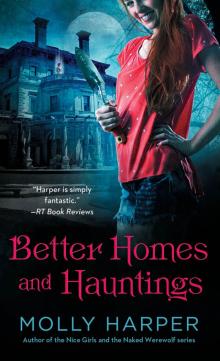 Better Homes and Hauntings
Better Homes and Hauntings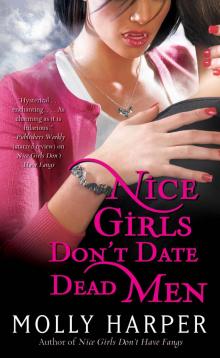 Nice Girls Dont Date Dead Men
Nice Girls Dont Date Dead Men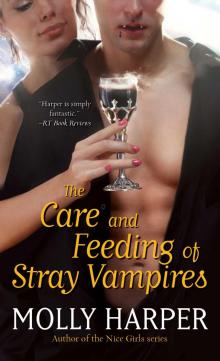 The Care and Feeding of Stray Vampires
The Care and Feeding of Stray Vampires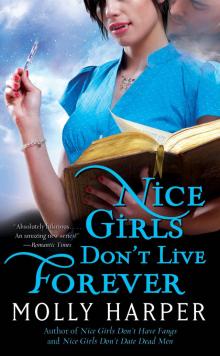 Nice Girls Dont Live Forever
Nice Girls Dont Live Forever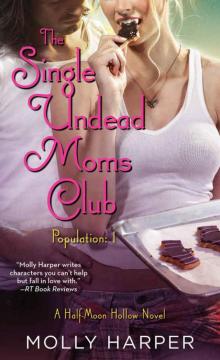 The Single Undead Moms Club
The Single Undead Moms Club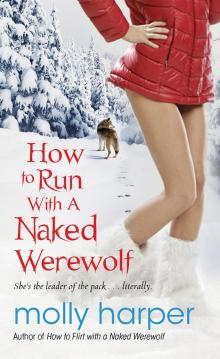 How to Run with a Naked Werewolf
How to Run with a Naked Werewolf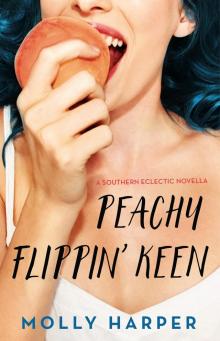 Peachy Flippin' Keen
Peachy Flippin' Keen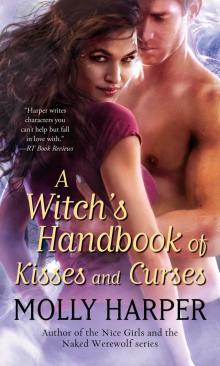 A Witchs Handbook of Kisses and Curses
A Witchs Handbook of Kisses and Curses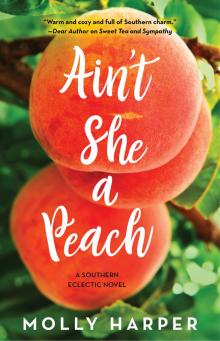 Ain't She a Peach?
Ain't She a Peach?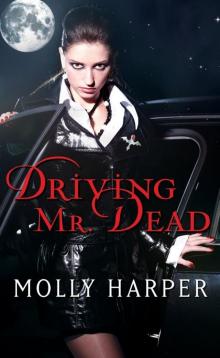 Driving Mr. Dead
Driving Mr. Dead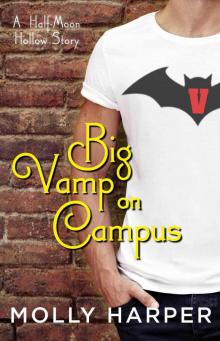 Big Vamp on Campus
Big Vamp on Campus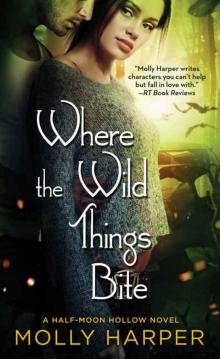 Where the Wild Things Bite
Where the Wild Things Bite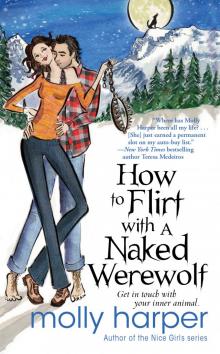 How to Flirt with a Naked Werewolf
How to Flirt with a Naked Werewolf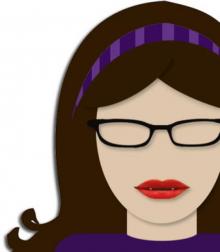 Nice Girls Don’t Sign a Lease Without a Wedding Ring
Nice Girls Don’t Sign a Lease Without a Wedding Ring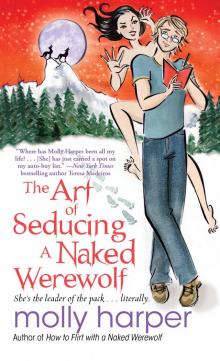 The Art of Seducing a Naked Werewolf
The Art of Seducing a Naked Werewolf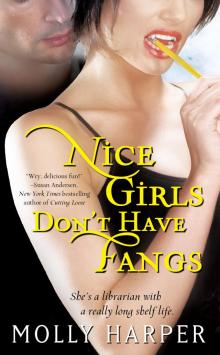 Nice Girls Dont Have Fangs
Nice Girls Dont Have Fangs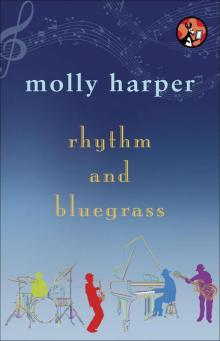 Rhythm and Bluegrass
Rhythm and Bluegrass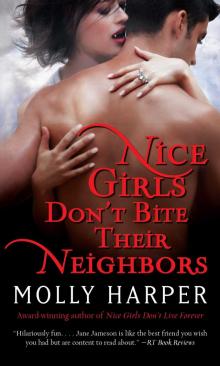 Nice Girls Dont Bite Their Neighbors
Nice Girls Dont Bite Their Neighbors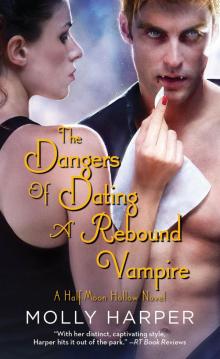 The Dangers of Dating a Rebound Vampire
The Dangers of Dating a Rebound Vampire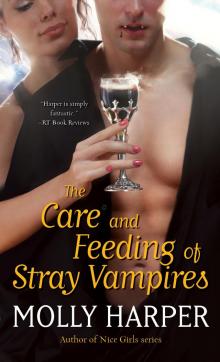 Undead Sublet
Undead Sublet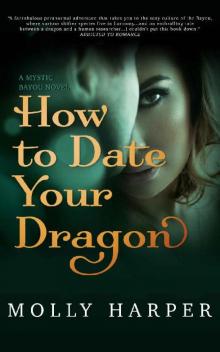 How to Date Your Dragon
How to Date Your Dragon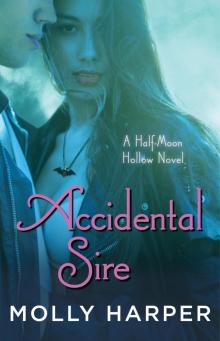 Accidental Sire
Accidental Sire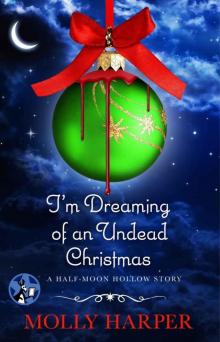 I'm Dreaming of an Undead Christmas
I'm Dreaming of an Undead Christmas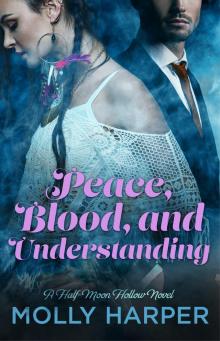 Peace, Blood, and Understanding
Peace, Blood, and Understanding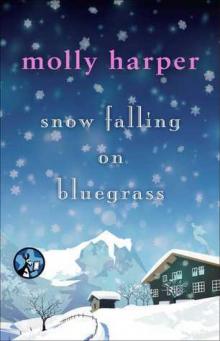 Snow Falling on Bluegrass
Snow Falling on Bluegrass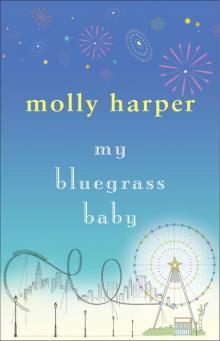 My Bluegrass Baby
My Bluegrass Baby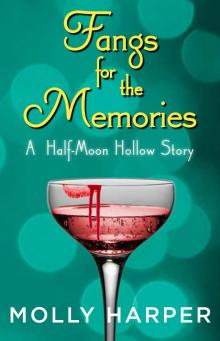 Fangs for the Memories
Fangs for the Memories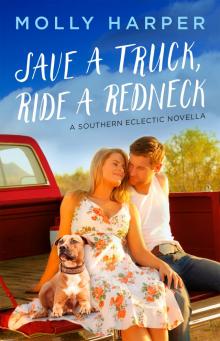 Save a Truck, Ride a Redneck
Save a Truck, Ride a Redneck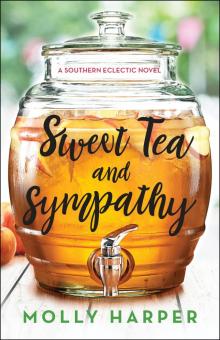 Sweet Tea and Sympathy
Sweet Tea and Sympathy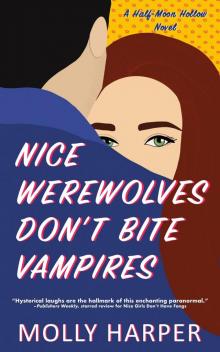 Nice Werewolves Don't Bite Vampires
Nice Werewolves Don't Bite Vampires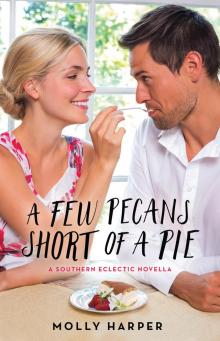 A Few Pecans Short of a Pie
A Few Pecans Short of a Pie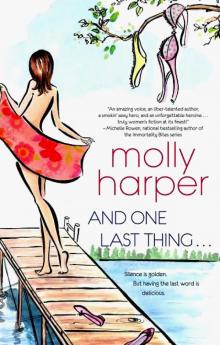 And One Last Thing ...
And One Last Thing ...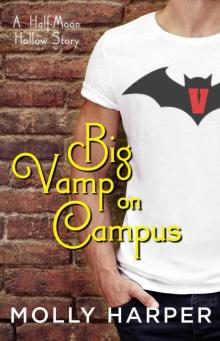 Big Vamp on Campus (Half-Moon Hollow Series Book 7)
Big Vamp on Campus (Half-Moon Hollow Series Book 7)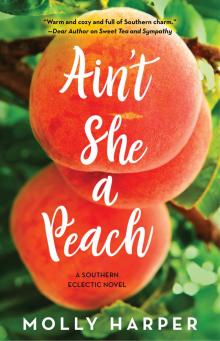 Ain't She a Peach
Ain't She a Peach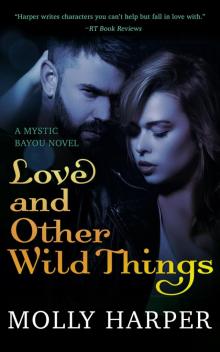 Love and Other Wild Things
Love and Other Wild Things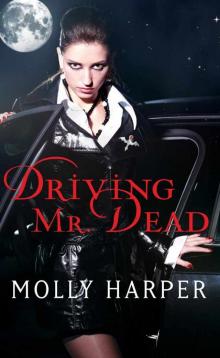 Driving Mr. Dead
Driving Mr. Dead![[Jane Jameson 03.5] Nice Girls Don't Sign A Lease Without A Wedding Ring Read online](http://i1.bookreadfree.com/i1/04/06/jane_jameson_03_5_nice_girls_dont_sign_a_lease_without_a_wedding_ring_preview.jpg) [Jane Jameson 03.5] Nice Girls Don't Sign A Lease Without A Wedding Ring
[Jane Jameson 03.5] Nice Girls Don't Sign A Lease Without A Wedding Ring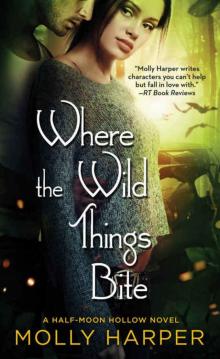 Where the Wild Things Bite (Half-Moon Hollow #8)
Where the Wild Things Bite (Half-Moon Hollow #8)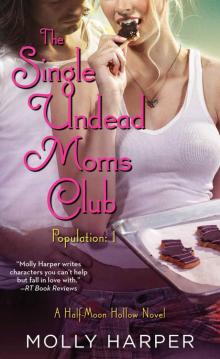 The Single Undead Moms Club (Half Moon Hollow series Book 4)
The Single Undead Moms Club (Half Moon Hollow series Book 4)